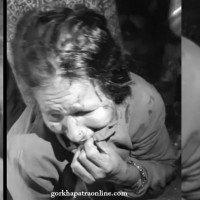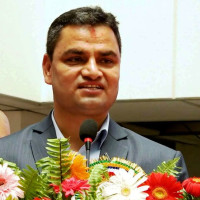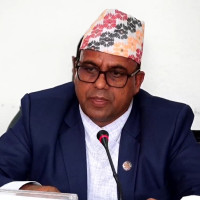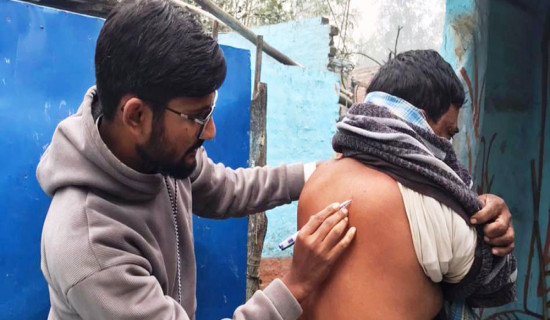- Monday, 27 January 2025
Significant progress in healthcare, but challenges remain: Minister Paudel
By Nisha Rai,Dharan, Jan. 25: Minister for Health and Population Pradip Paudel has stated that while significant progress has been made in the healthcare sector, it is still insufficient.
He made these remarks during the inauguration of the newly constructed burn unit, cancer unit and pharmacy building at BP Koirala Institute of Health Sciences in Dharan on Thursday.
“To address this incompleteness, effective services must be provided, ensuring affordable, accessible, and free treatment for the underprivileged,” Minister Paudel said.
He added that BP Koirala Institute of Health Sciences should be the first hospital to provide such services.
Minister Paudel emphasised that it was unlawful for government institutions to lack essential medicines and said all hospitals should stock all required drugs.
“The more medicines available, the better the services provided,” he said.
He also stated that pharmacies should stock all types of medicines and operate with the aim of benefiting the general public.
Minister Paudel urged the pharmacies to display a comprehensive list of available medicines on boards outside the premises.
Highlighting the current scenario, he said that patients requiring chemotherapy still had to travel to Kathmandu or Chitwan for treatment.
He informed that a programme has been initiated to expand cancer treatment facilities to all seven provinces, with services already available in Dhangadhi, Bheri, Surkhet, and other locations.
BP Koirala Institute has also begun providing effective treatment.
Minister Paudel announced the government’s decision to provide free burn treatment for underprivileged patients at eight hospitals across Nepal, including Bir Hospital in Kathmandu, Kirtipur Hospital, and BP Koirala Institute of Health Sciences, starting from January 23.
Expressing satisfaction with the introduction of three new services at the hospital, he said, “This hospital will provide services to not only the patients from the region but also those from other areas.”
He emphasised the need for legal measures to ensure a stress-free environment for medical professionals and to accord them the respect they deserve.
Earlier Thursday, Minister Paudel decided to provide free medication to haemophilia patients, a hereditary blood clotting disorder.
Patients and stakeholders have been urging the government to take responsibility for arranging the treatment of diseases that require extremely expensive medication.
To address this, the Ministry of Health and Population will now make the required medication available through federal hospitals, provincial hospitals and other government hospitals.
“We have decided to provide these medications, procured through grants from the World Haemophilia Federation, via government hospitals,” said Minister Paudel.
“We have accepted requests from many affected individuals and stakeholders to cover the high cost of treatment,” he said.
Dr Krishna Paudel, head of the Ministry’s Policy, Planning, and Monitoring Division, said that the medications would be provided without imposing a financial burden on the state treasury, as they will be obtained through grants from the World Haemophilia Federation. Currently, there are about 900 identified haemophilia patients in Nepal.
However, the World Health Organisation estimates that approximately 5,000 patients remain undiagnosed.
According to the 2021 census, of the 2.2 per cent of individuals identified with disabilities, 0.8 per cent could potentially have haemophilia.
The Ministry has prepared to supply medications to federal, provincial, and government hospitals based on demand, according to the Minister’s Secretariat.

















